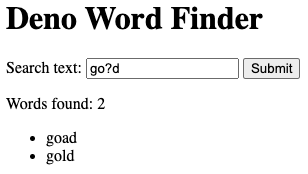On this page
Building a word finder app with Deno
Getting Started Jump to heading
In this tutorial we'll create a simple Word Finder web application using Deno. No prior knowledge of Deno is required.
Introduction Jump to heading
Our Word Finder application will take a pattern string provided by the user and
return all words in the English dictionary that match the pattern. The pattern
can include alphabetical characters as well as _ and ?. The ? can stand
for any letter that isn't present in the pattern. _ can stand for any letter.
For example, the pattern c?t matches "cat" and "cut". The pattern go?d
matches the words "goad" and "gold" (but not "good").

Building the View Jump to heading
The function below renders the HTML that creates the simple UI displayed above. You can specify a pattern and list of words to customize the HTML content. If a pattern is specified then it will show up in the search text box. If the word list is specified, then a bulleted list of words will be rendered.
export function renderHtml(pattern, words) {
let searchResultsContent = "";
if (words.length > 0) {
let wordList = "";
for (const word of words) {
wordList += `<li>${word}</li>`;
}
searchResultsContent = `
<p id="search-result-count" data-count="${words.length}">Words found: ${words.length}</p>
<ul id="search-result" name="search-results">
${wordList}
</ul>
`;
}
return `<html>
<head>
<title>Deno Word Finder</title>
<meta name="version" content="1.0" />
</head>
<body>
<h1>Deno Word Finder</h1>
<form id="perform-search" name="perform-search" method="get" action="/api/search">
<label for="search-text">Search text:</label>
<input id="search-text" name="search-text" type="text" value="${pattern}" />
<input type="submit" />
</form>
${searchResultsContent}
<h2>Instructions</h2>
<p>
Enter a word using _ and ? as needed for unknown characters. Using ? means to include letters that aren't already used (you can think of it as a "Wheel of Fortune" placeholder). Using _ will find words that contain any character (whether it's currently "revealed" or not).
<br />
<br />
For example, d__d would return:
<ul>
<li>dand</li>
<li>daud</li>
<li>dead</li>
<li>deed</li>
<li>dird</li>
<li>dodd</li>
<li>dowd</li>
<li>duad</li>
<li>dyad</li>
</ul>
<br />
And go?d would return:
<ul>
<li>goad</li>
<li>gold</li>
</ul>
</p>
</body>
</html>
`;
}
Searching the Dictionary Jump to heading
We also need a simple search function which scans the dictionary and returns all words that match the specified pattern. The function below takes a pattern and dictionary and then returns all matched words.
export function search(pattern, dictionary) {
// Create regex pattern that excludes characters already present in word
let excludeRegex = "";
for (let i = 0; i < pattern.length; i++) {
const c = pattern[i];
if (c != "?" && c != "_") {
excludeRegex += "^" + c;
}
}
excludeRegex = "[" + excludeRegex + "]";
// Let question marks only match characters not already present in word
let searchPattern = pattern.replace(/\?/g, excludeRegex);
// Let underscores match anything
searchPattern = "^" + searchPattern.replace(/\_/g, "[a-z]") + "$";
// Find all words in dictionary that match pattern
let matches = [];
for (let i = 0; i < dictionary.length; i++) {
const word = dictionary[i];
if (word.match(new RegExp(searchPattern))) {
matches.push(word);
}
}
return matches;
}
Running a Deno Server Jump to heading
Oak is a framework that lets you easily setup
a server in Deno (analogous to JavaScript's Express) and we'll be using it to
host our application. Our server will use our search function to populate our
HTML template with data and then return the customized HTML back to the viewer.
We can conveniently rely on the /usr/share/dict/words file as our dictionary
which is a standard file present on most Unix-like operating systems.
import { Application, Router } from "https://deno.land/x/oak/mod.ts";
import { search } from "./search.js";
import { renderHtml } from "./render.js";
const dictionary = (await Deno.readTextFile("/usr/share/dict/words")).split(
"\n",
);
const app = new Application();
const port = 8080;
const router = new Router();
router.get("/", async (ctx) => {
ctx.response.body = renderHtml("", []);
});
router.get("/api/search", async (ctx) => {
const pattern = ctx.request.url.searchParams.get("search-text");
ctx.response.body = renderHtml(pattern, search(pattern, dictionary));
});
app.use(router.routes());
app.use(router.allowedMethods());
console.log("Listening at http://localhost:" + port);
await app.listen({ port });
We can start our server with the following command. Note we need to explicitly grant access to the file system and network because Deno is secure by default.
deno run --allow-read --allow-net server.js
Now if you visit http://localhost:8080 you should be able to view the Word Finder app.
Example Code Jump to heading
You can find the entire example code here.